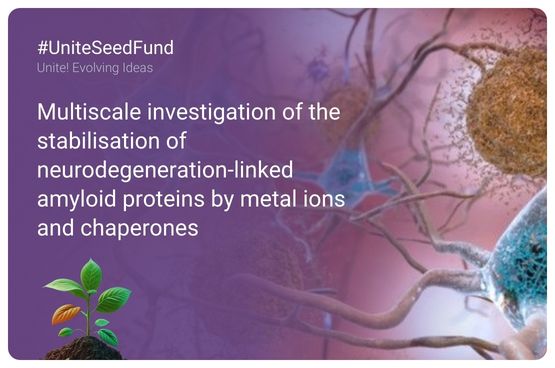
Understanding protein aggregation to improve therapies for neurodegenerative diseases
This Unite! Seed Fund project aims to understand how pathological processes are regulated in the human brain to develop mitigating therapies.
Neurodegenerative diseases are associated with misfolding and aggregation of specific proteins, e.g. amyloid beta (linked to Alzheimer’s disease) and alpha-synuclein (linked to Parkinson’s disease) that are believed to contribute to neuronal dysfunction leading to dementia. Understanding how these pathological processes are regulated in the human brain is critical to develop mitigating therapies. A team from TU Darmstadt, ULisboa, and Politecnico di Torino are working together to fill this gap by investigating molecular factors implicated in protein aggregation during neurodegeneration.
The project “Multiscale investigation of the stabilisation of neurodegeneration-linked amyloid proteins by metal ions and chaperones” aims to improve the understanding of neurodegeneration by investigating the interactions of specific aggregation-prone proteins with metal ions and so-called chaperone proteins, which can prevent aggregation and decrease toxicity. The current lack of detailed insight into these processes hinders the development of therapies.
“By bringing together expertise in proteins, analytical methods, and computational modelling from different Unite! universities, we have the potential to make real progress in understanding these diseases, which are a huge problem at a time when nearly every society on Earth is rapidly ageing.”
The complementary expertise of the teams involved will allow the combination of in vitro and in silico methods to characterise protein aggregation, interactions, and the dynamic populations of protein oligomers under conditions that recreate the biochemistry of the diseased brain, in which protein and metal ion homeostasis are known to be dysregulated. For this, researchers from TU Darmstadt, ULisboa, and Politecnico di Torino will investigate S100 proteins, which are chaperones that play a crucial role in dynamically regulating proteins and metal ions to prevent amyloid aggregation. The project includes protein expression, mass spectrometry, spectroscopy, and computational modelling, and places strong emphasis on training PhD students from the three Unite! Universities who conduct the research activities. The project will foster the establishment of Erasmus+ bilateral agreements and research exchange programmes to reinforce training of students within the alliance.
Preliminary results were disseminated during a hybrid workshop organised at ULisboa in March 2024, where researchers presented and discussed initial results, networked, and engaged in intensive brainstorming. The promising results obtained so far pave the way for future joint publications and grant applications to further advance the research.

